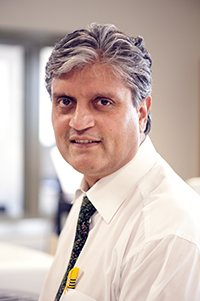Amolak Bansal
Doctor Amolak Bansal is a consultant immunologist at the Epsom & St Helier University Hospitals in the United Kingdom. He has researched the involvement of B cells (also known as B lymphocytes) in myalgic encephalomyelitis/chronic fatigue syndrome (ME/CFS).
Current ongoing work[edit | edit source]
- Evaluation of Glucocorticoid receptor resistance in CFS as determined from leucocyte GCRalpha and beta mRNA.[1]
Notable studies[edit | edit source]
- 2016, Investigating unexplained fatigue in general practice with a particular focus on CFS/ME. FULL TEXT
Abstract - "Unexplained fatigue is not infrequent in the community. It presents a number of challenges to the primary care physician and particularly if the clinical examination and routine investigations are normal. However, while fatigue is a feature of many common illnesses, it is the main problem in Chronic Fatigue Syndrome/Myalgic Encephalomyelitis (CFS/ME). This is a poorly understood condition that is accompanied by several additional symptoms which suggest a subtle multisystem dysfunction. Not infrequently it is complicated by sleep disturbance and alterations in attention, memory and mood. Specialised services for the diagnosis and management of CFS/ME are markedly deficient in the UK and indeed in virtually all countries around the world. However, unexplained fatigue and CFS/ME may be confidently diagnosed on the basis of specific clinical criteria combined with the normality of routine blood tests. The latter include those that assess inflammation, autoimmunity, endocrine dysfunction and gluten sensitivity. Early diagnosis and intervention in general practice will do much to reduce patient anxiety, encourage improvement and prevent expensive unnecessary investigations. There is presently an on-going debate as to the precise criteria that best confirms CFS/ME to the exclusion of other medical and psychiatric/psychological causes of chronic fatigue. There is also some disagreement as to best means of investigating and managing this very challenging condition. Uncertainty here can contribute to patient stress which in some individuals can perpetuate and aggravate symptoms. A simple clinical scoring system and a short list of routine investigations should help discriminate CFS/ME from other causes of continued fatigue.[2]
- 2015, Extended B-cell phenotype in patients with Myalgic Encephalomyelitis/Chronic Fatigue Syndrome: A cross-sectional study (Fane Mensah, Amolak Bansal, Saul Berkovitz, Arti Sharma, Venkat Reddy, Maria Leandro, Geraldine Cambridge, funded by Invest in ME)
- 2014, Psychosocial factors involved in memory and cognitive failures in people with myalgic encephalomyelitis/chronic fatigue syndrome (Attree EA, Arroll MA, Dancey CP, Griffith C, Amolak Bansal)
- 2013, Altered functional B cell subset populations in patients with chronic fatigue syndrome compared to healthy controls. FULL TEXT
Abstract: "Chronic fatigue syndrome (CFS) is a heterogeneous disorder of unknown aetiology characterized by disabling fatigue, headaches, sleep disturbance and several other symptoms. The onset of CFS may follow a viral infection or period of stress. Patients with CFS do not have hypogammaglobulinaemia, predisposition to recurrent bacterial infections or symptoms of autoimmunity. To date, defects in B cell numbers or function have not been shown in the literature. However, treatment with anti-B cell therapy using Rituximab has recently shown benefit to CFS patients. We therefore postulated that patients with CFS had a subtle humoral immune dysfunction, and performed extended B cell immunophenotyping. We undertook a detailed characterization of the proportions of the different B cell subsets in 33 patients with CFS fulfilling the Canadian and Fukada criteria for CFS and compared these with 24 age- and gender-matched healthy controls (HC). CFS patients had greater numbers of naive B cells as a percentage of lymphocytes: 6·3 versus 3·9% in HC (P = 0·034), greater numbers of naive B cells as a percentage of B cells: 65 versus 47% in controls (P = 0·003), greater numbers of transitional B cells: 1·8 versus 0·8% in controls (P = 0·025) and reduced numbers of plasmablasts: 0·5 versus 0·9% in controls (P = 0·013). While the cause of these changes is unclear, we speculate whether they may suggest a subtle tendency to autoimmunity."[3]
- 2012, Chronic fatigue syndrome, the immune system and viral infection (Amolak Bansal, Bradley AS, Bishop KN, Kiani-Alikhan S, Ford B.)
- 2011, The impact of CFS/ME on employment and productivity in the UK: a cross-sectional study based on the CFS/ME national outcomes database (Collin SM1, Esther Crawley, May MT, Sterne JA, Hollingworth W, O'Dowd H, Butt K, Dunn D, Pemberton S, White P, Murphy M, Mullick Y, Amolak Bansal)
Talks & interviews[edit | edit source]
- 2015, Jorgen Jelstad TV interview at ME conference (18 Nov 2015)
- 2015, Speaker at the 10th Invest in ME International ME Conference - DVD available Speech title - "Diagnosis and Differential Diagnosis: Combining clinic and research
- 2014, 2014 - Dr. Amolak S. Bansal - Seminarium om barn och unga med ME/CFS
Online presence[edit | edit source]
Learn more[edit | edit source]
See also[edit | edit source]
References[edit | edit source]
- ↑ 2014 - Dr. Amolak S. Bansal - Seminarium om barn och unga med ME/CFS
- ↑ Bansal, Amolak (July 19, 2016), "Investigating unexplained fatigue in general practice with a particular focus on CFS/ME", BMC Family Practice, 17 (81), doi:10.1186/s12875-016-0493-0
- ↑ Bradley, AS; Ford, B; Bansal, Amolak (2013), "Altered functional B cell subset populations in patients with chronic fatigue syndrome compared to healthy controls", Clinical and Experimental Immunology, 172 (1): 73–80, doi:10.1111/cei.12043


